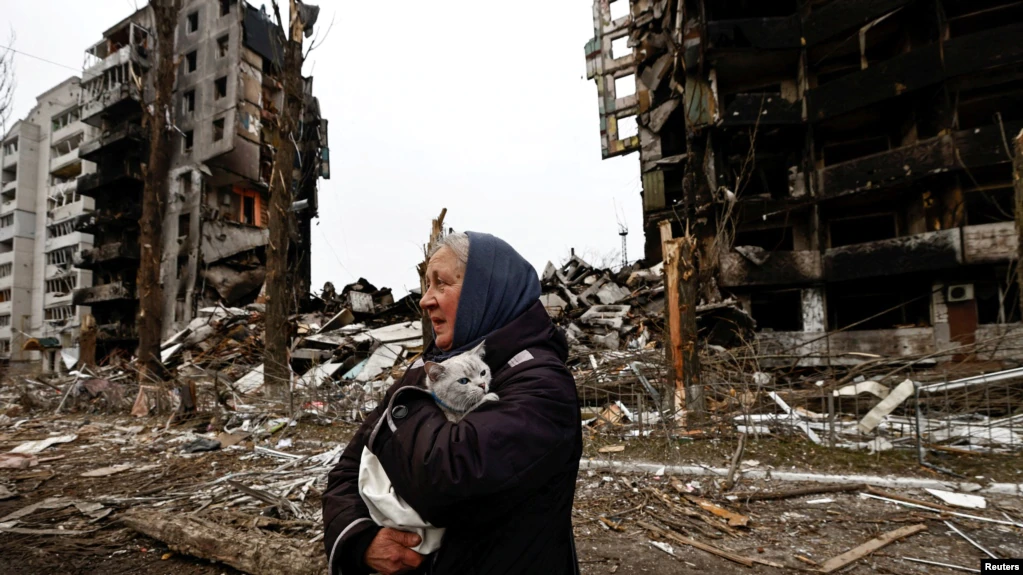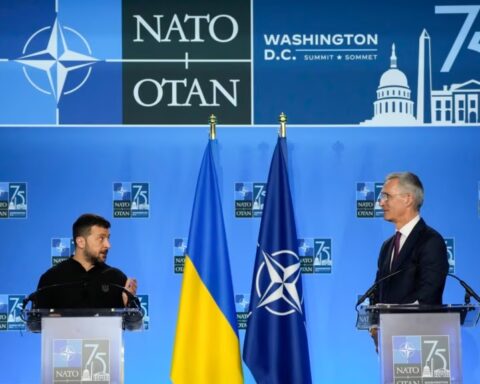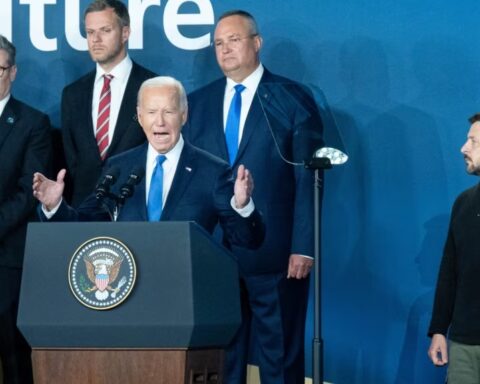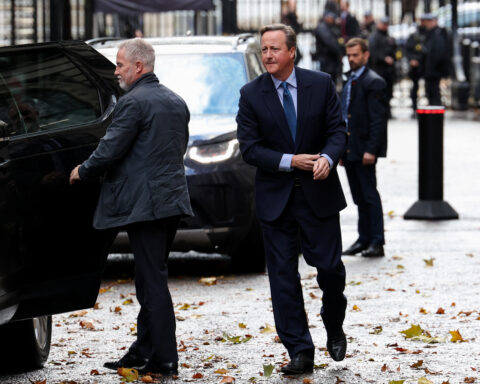Just weeks after Russian President Vladimir Putin launched his country’s unprovoked full invasion of Ukraine on February 24, Ukrainian President Volodymyr Zelenskiy, who has proven a master of messaging, bluntly told the Kremlin it would have to “learn the words ‘reparations’ and ‘contributions.'”
More than nine months after the start of the invasion and with no hint that Putin is ready to end his country’s aggression, talk is slowly turning not only to rebuilding Ukraine once the conflict does end, but to how and who will finance what Zelenskiy has declared will be “the largest economic project in Europe of our time,” likely to cost hundreds of billions of dollars.
For Ukraine, the answer is clear: Russia must ultimately pay for justice to be served. “There is no alternative to Russia paying,” explained Markiyan Kliuchkovskiy, a lawyer and member of a Ukrainian government working group on reparations. “If Russia does not want to honor its obligation to pay reparations for the damage and suffering it has caused, we, together with the civilized world, need to find a way for Russia to pay,” Kliuchkovskiy told RFE/RL.
Like other Ukrainian officials, Kliuchkovskiy points to the UN General Assembly which passed a nonbinding resolution on November 14 that calls for Russia to pay war reparations. Nearly 50 nations cosponsored the resolution on establishing an international mechanism for compensation for damage, loss, and injury, as well as a register to document evidence and claims.
“The UN General Assembly resolution is very important because it directly states that Russia has to be held accountable and offers a mechanism to do that,” Kliuchkovskiy said.
But Russia rejected that vote. Russian Ambassador to the UN Vasily Nebenzya said countries backing the resolution were attempting to position the General Assembly as a judicial body, which, he said, it is not.
And with it holding a veto on the UN Security Council, Russia could block attempts by Ukraine to seek justice in the world body. That could also hamper Kyiv in its efforts to seize the billions of frozen Russian assets abroad to help finance its postwar recovery.
Modelled On The Marshall Plan
Instead, many in the West are talking of a Marshall Plan financed by the West as the answer, modelled after the successful U.S. program to rebuild much of Western Europe after World War II. Money aside, proponents of a Marshall-type plan argue that it would also benefit Ukraine’s democratic development and ambitions to join the European Union.
A report by the Washington-based German Marshall Fund — named after the former U.S. secretary of state, George Marshall, who proposed the U.S. plan in 1947 — on postwar reconstruction of Ukraine notes that Western backers will be wary about pouring large amounts of money into Ukraine given its reputation for corruption.
However, that leverage will push Ukraine to overhaul its institutions and courts if it wants a rapid integration into Europe, the report says, along with the help of the European Union, which has strict legal standards for membership and has offered the country candidate status.
That kind of package could give Ukraine an injection of much-needed Western technology, catapulting it forward, explained Jakob Kirkegaard, one of the authors of the Marshall Fund report: Designing Ukraine’s Recovery In The Spirit Of The Marshall Plan.
“Larger infrastructure, especially energy and transport infrastructure being rebuilt will be ‘built back better’ with an eye to EU standards and abandoning the often Soviet designs, representing the modernization of Ukraine’s infrastructure that will eventually make it competitive also inside the EU,” Kirkegaard told RFE/RL in e-mailed remarks.
That funding would come on top of what the West is already providing Kyiv not only in military assistance, but financial aid to keep the government afloat.
Ukraine will need at least $3 billion — and as much as $5 billion — a month in 2023, the head of the International Monetary Fund recently said. “This is no easy task,” IMF Managing Director Kristalina Georgieva told world leaders gathered on October 25 to discuss Ukrainian recovery and macro-financing needs.
The Damage
The price Ukraine has paid for Russia’s full invasion is huge and rising.
Russia is accused of committing more than 40,000 war crimes, Ukraine’s Interior Ministry said on October 27. The invasion has also driven some 14 million Ukrainians from their homes in “the fastest, largest displacement witnessed in decades,” according to the UN refugee chief, Filippo Grandi.
Ukraine’s gross domestic product (GDP) has fallen this year by a staggering 32 percent — more than in the United States during the Great Depression of the 1930s.

Infrastructure across the country, much of it civilian, has been targeted in Russian military strikes. Cities, most notably Mariupol, have been turned to rubble. Ukrainian Prime Minister Denys Shmyhal said on September 5 that Russia’s invasion had caused $326 billion of damage and that $105 billion would be needed for immediate rebuilding.
That $105 billion figure was slightly lower than another estimate later that month. Researchers at the Kyiv School of Economics, who work with several Ukrainian ministries to collate data, said that more than $127 billion of damage had been documented to residential and nonresidential real estate, plus other infrastructure.
Those figures, however, are dwarfed by the estimate offered by President Zelenskiy, who said on September 6 that “more than $1 trillion” would be needed to rebuild Ukraine, declaring that it “will be the largest economic project in Europe of our time.” Zelenskiy’s figure is higher because it also includes the “modernization” of infrastructure to bring it in line with EU standards, Kirkegaard said.

Ukrainian Deputy Justice Minister Iryna Mudra, a former banker who has been involved in talks on reparations with European and U.S. partners, including U.S. Treasury Assistant Secretary Elizabeth Rosenberg, said on November 22 that Kyiv would create “an international register of losses,” which she explained would serve as an official record of all damages suffered by Ukraine, both individuals and institutions.
Ukraine has also teamed up with Columbia Law School in New York City to establish the International Claims and Reparations Project (ICRP) whose “team of scholars and experts will examine and propose legal frameworks for the management of international claims in reparations.”
A History Of Reparations
Paying for damage or injury, or reparations, have long been levied on the losing side of conflicts for centuries. After the First and Second Punic Wars, Rome imposedhefty war indemnities on Carthage.
Germany faced steep war reparations after World War I, as well as the war guilt clause, which has been considered a factor in the rise of Adolf Hitler’s Third Reich. That reparations bill was finally paid off in 2010.
Germany was again hit by heavy reparations after World War II by the Allied powers.
More recently, however, war reparations have “featured prominently in only four or five interstate conflicts at most,” explained Laurie Blank, an Emory Law School professor and director of its Center for International and Comparative Law. Those conflicts include Iraq’s invasion of Kuwait, the 1998-2000 Ethiopia-Eritrea war, and Uganda’s intervention in the Democratic Republic of Congo.
“As a result, the international community’s ‘muscle memory’ for interstate reparations is somewhat weak,” Blank wrote in an article in May on the Just Security forum that focused on war reparations for Ukraine.
How To Get Russia To Pay
In that piece, Blank spelled out a few options to get Russia to pay Ukraine war reparations, including having them incorporated in any peace agreement or settlement between Kyiv and Moscow, something almost unthinkable now as any end to the conflict seems far off.
Another possibility, Blank wrote, was establishing a multilateral commission or mechanism to oversee the process, much like the UN Compensation Commission (UNCC) set up after Iraq’s invasion of Kuwait in 1990 and the Persian Gulf War in 1991.
Like others, Kliuchkovskiy mentions the UNCC for Kuwait as a possible template for Ukraine. But with Russia holding a veto on the UN Security Council, that idea is unlikely to get approval.

Shortly after the Russian invasion in February, the United States established the Russian Elites, Proxies, and Oligarchs (REPO) task force, which has so far blocked or frozen $30 billion worth of assets belonging to Russians, including luxury yachts worth tens of millions of dollars. Members of the international task force include Australia, Britain, Canada, France, Germany, Italy, Japan, and the European Commission.
On top of assets belonging to sanctioned individuals, the United States, countries of the EU, and other Western nations have frozen more than $300 billion of Russian Central Bank assets.
Some states, like Estonia, Latvia, Lithuania, and Slovakia, have joined Ukraine in calling for these assets to be used as part of the reparations and, in June, the Group of Seven (G7) advanced economies of the world vowed to explore the idea.
However, freezing assets and seizing assets are two different things, offering different challenges, as Western officials have made clear. “We will explore all legal possibilities to make sure that Russia will pay for the destruction it’s causing in Ukraine,” Josep Borrell, the EU’s foreign policy chief, said in Poland in early December at a ministerial conference of the Organization for Security and Cooperation in Europe (OSCE).
U.S. Treasury Secretary Janet Yellen has unequivocally stated that current U.S. law makes it impossible for Washington to seize those Russian bank assets. That’s because the U.S. federal law, the International Emergency Economic Powers Act (IEEPA), that allows Washington to freeze those assets would only permit their seizure under very specific circumstances, explained Andrew Boyle, a lawyer who has worked and written on sanctions issues and is now involved with an international tribunal, about which he was not at liberty to disclose.
“It’s unlikely that the U.S. will deliver frozen Russian central bank assets to Ukraine absent: 1) Russian approval (e.g., as part of a negotiated peace) or 2) a congressionally enacted change to IEEPA,” Boyle told RFE/RL in written remarks.

To get Ukraine some of these funds, EU Justice Commissioner Didier Reynders has suggested using the frozen Russian central bank foreign-exchange reserves around the world as a sort of bargaining chip. “From my point of view, it is at least possible to keep these 300 billion euros ($316 billion) as a guarantee until Russia voluntarily participates in the reconstruction of Ukraine,” Reynders said in late October.
The EU on November 30 did propose a plan to confiscate frozen Russian assets, but that still faces legal challenges, experts say. “Russia and its oligarchs have to compensate Ukraine for the damage and cover the costs for rebuilding the country,” EU Commission President Ursula von der Leyen said. “We have the means to make Russia pay.”
‘A Generational Task’
While it still is unclear how Russia will pay, it is already evident the task of rebuilding Ukraine will be vast.
In Berlin on October 25, at the conference on Ukraine’s reconstruction, the IMF’s Georgieva said that, once the fighting stops, the cost estimates of the second “reconstruction phase” were “truly astounding.”
“Beyond damage costs the [World] Bank estimates total reconstruction needs in the order of $349 billion,” she said. “These are truly staggering figures — well beyond Ukraine’s annual GDP of $200 billion in 2021, before Russia’s invasion.”
German Chancellor Olaf Scholz, who dubbed the proposal the “new Marshall Plan,” told the same gathering that rebuilding Ukraine would be a “generational task that must begin now.”

In June, at an international conference in Lugano, Switzerland, Ukraine presented its own national recovery program, which lays out plans and timelines for reconstruction across a wide spectrum.
The German Marshall Fund report suggests that the G7 should participate in an international recovery platform, with an American “with global stature” at the helm and based on a sequenced approach: “relief, reconstruction, modernization, and accession to the EU.”
Asked whether Ukraine could find itself saddled with debt to finance its own reconstruction, report author Kirkegaard is skeptical.
“The vast majority of Ukrainian financial support comes in the form of grants or –as with the EU — long-term loans that will never be repaid. In addition, Ukraine’s existing debt is currently being extended voluntarily by creditors,” the analyst said, predicting that “Ukraine can look forward to many years of very, very rapid economic growth after the war,” making any debt load much lighter.
Kirkegaard also expects that ultimately Russia will “lose their frozen sovereign assets to de facto war reparations for Ukraine.” He adds that “Russia will be a far, far poorer country because of this war.”
For Ukrainian lawyer Kliuchkovskiy, getting Russia to pay is paramount. “We have to find a way to make sure international law works,” he said. “If a state commits egregious violations of international law, as Russia has, and goes unpunished, then what does that say about international law? We have faith that justice will prevail.”





